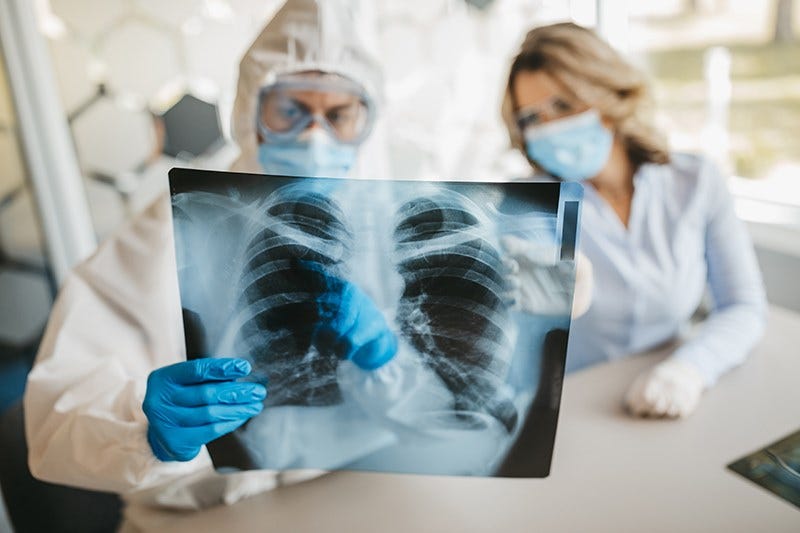COVID Grant Boosts Startup’s Lung Therapy
 The NSF awarded Spirrow a COVID-specific $256
The NSF awarded Spirrow a COVID-specific $256
Subscriber Benefit
As a subscriber you can listen to articles at work, in the car, or while you work out. Subscribe NowPeople with COVID-19 landing in the Intensive Care Unit and being put on a ventilator has become a common—and terrifying—sequence of events for both patients and their loved ones. West Lafayette-based startup Spirrow Therapeutics recently earned a grant from the National Science Foundation (NSF) to further develop its technology that could interrupt this dangerous domino effect, not only for COVID-19 patients, but for anybody with acute respiratory distress syndrome (ARDS). With nearly half of all ICU patients battling the condition even before COVID-19, the pandemic has only highlighted doctors’ desperate need for better ways to intervene.
“Before COVID, a very high percentage of patients that end up in the ICU have ARDS; around 40%. Post COVID, nobody knows yet what those numbers will look like, but it’s probably going to go up to 50% or 60%,” says Spirrow Therapeutics President and Chief Executive Officer Richard Ganz. “And [ARDS] has high mortality rates; around 40%. It’s probably higher than that now because of COVID.”
ARDS is a life-threatening lung condition caused by physical trauma or infection, including COVID-19, in which fluid collects in the lungs’ air sacs, depriving organs of oxygen. People with ARDS have severe shortness of breath and often are unable to breathe on their own without support from a ventilator.
“The sad reality is there are not very many good options for treating ARDS,” says Ganz. “Physicians most commonly use conventional IV steroids to treat ARDS to try to calm the cytokine storm (a severe immune reaction) and reduce inflammation.”
Unlike traditional methods that use an IV, the startup’s therapy is delivered directly to the lungs via the tube already in place as a result of the patient being intubated. Delivered in liquid form, Spirrow’s lung therapy is a synthetic version of the natural surfactant lungs make in their healthy condition. To better understand how Spirrow’s polymer lung surfactant works, Ganz explains that liquid dish detergent also relies on a surfactant.
“Detergents change the surface tension between water and grease and allow the surface tension to change. That’s essentially what the natural surfactant does [in the lungs]; it changes the surface tension in the alveoli,” says Ganz. “In ARDS, your lungs lose the ability to generate that naturally occurring lung surfactant. [Our liquid therapy] is simply injected directly into the lungs, and the surfactant minimizes the surface tension…between air and the alveoli, restoring the lung’s natural ability to oxygenate. The alveoli are the parts of the lung that actually do oxygen transfer. That’s what we’re hoping to restore.”
Ganz says lung surfactants have long been used to treat newborns, and Spirrow’s technology resolves the issues that prevented them from working in adults. The startup also believes a single dose of its therapy will successfully treat most ARDS patients.
Spirrow co-founder and Purdue University Chemical Engineering Professor Dr. You-Yeon Won and his former students Davis Arick and Kyle Kim made the discoveries that gave birth to the startup’s technology. Spirrow, which worked with the Purdue Foundry, purchased the exclusive worldwide license for the technology from the university before the pandemic, but the young company got an important boost when COVID-19 gripped the nation. The NSF awarded Spirrow a COVID-specific $256,000 Small Business Technology Transfer Phase 1 award.
Indianapolis-based Elevate Ventures has also invested in Spirrow. The startup is hopeful the therapy could be used in patients by the first half of 2022. Spirrow is also working on a second-generation therapy that would involve aerosolization of the product, which would “open up a much broader market” and allow it to be delivered via a nebulizer or an asthma inhaler-like device.
“We can then use it as a prophylaxis (a preventative) rather than for acute treatment,” says Ganz. “In terms of COVID, that would mean patients who are already seeing a deterioration of their lung function, but aren’t in the hospital yet, could potentially be treated with our product and not have to be admitted to the hospital.”
However, Spirrow’s immediate focus is perfecting its therapy for the most critical ARDS patients.
“With COVID, I think the lack of available treatments has certainly brought a lot of attention to pulmonary disease, and pulmonologists in general…and that we’ve got to have better treatments for patients when they find themselves in this situation,” says Ganz. “We’re optimistic this product will have a big impact on [the sequence of conditions] that happen in the ICU and hopefully restore lung function to a lot of people.”
Ganz says the recent Phase 1 award from the NSF has several significant benefits.
Ganz says working with Purdue to launch Spirrow has been “enormously helpful.”
